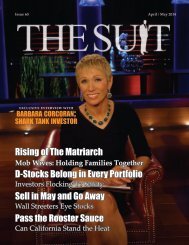o_19grqq7snim9mn019q11f7ds26a.pdf
Marcus Lemonis, a serial entrepreneur and host of the show “The Profit” on CNBC, is a true survivor in the corporate world. The native-born Lebanese business man endured the chaos of a civil war in Beirut and eventually moved to Miami. Lemonis was exposed to the automotive industry throughout his upbringing - his grandfather owning two of the largest Chevrolet dealerships in the United States and Lee Iacocca serving as the family friend and later mentor to Lemonis. On page 12, we conducted an interview with “Profit” host Marcus Lemonis, who offers struggling small businesses capital investment and his expertise in exchange for an ownership stake in the company. In the latter part of the magazine, we interviewed countless wealth advisors during these tough economic times. We recognize that some of the changes in 2013 and 2014 require relevance for financial planners. Therefore, the financial industry continues to push for more realistic standards and reforms.
Marcus Lemonis, a serial entrepreneur and host of the show “The Profit” on CNBC, is a true survivor in the corporate world. The native-born Lebanese business man endured the chaos of a civil war in Beirut and eventually moved to Miami. Lemonis was exposed to the automotive industry throughout his upbringing - his grandfather owning two of the largest Chevrolet dealerships in the United States and Lee Iacocca serving as the family friend and later mentor to Lemonis. On page 12, we conducted an interview with “Profit” host Marcus Lemonis, who offers struggling small businesses capital investment and his expertise in exchange for an ownership stake in the company. In the latter part of the magazine, we interviewed countless wealth advisors during these tough economic times. We recognize that some of the changes in 2013 and 2014 require relevance for financial planners. Therefore, the financial industry continues to push for more realistic standards and reforms.
You also want an ePaper? Increase the reach of your titles
YUMPU automatically turns print PDFs into web optimized ePapers that Google loves.
The 7 Most Common<br />
Negotiating Mistakes<br />
Wh ile<br />
even the word “negotiation”<br />
can evoke<br />
fear, stress and anxiety<br />
for many, the<br />
intent is quite simple: to discuss and<br />
ultimately agree on a deal. Whether<br />
it’s a multimillion dollar contract or<br />
just deciding where to meet for lunch,<br />
life is rife with negotiations. And,<br />
the negotiation process is a lot like<br />
a chess game where strategy reigns<br />
supreme—one thoughtfully considered<br />
move at a time. Make a careless,<br />
short-sighted, ill-conceived move and<br />
suffer the perilous consequences.<br />
“Even when faced with the most daunting<br />
of deals, regarding the act of negotiation<br />
as a ‘game’ may alleviate the<br />
apprehension and give you the confidence<br />
to make power plays that will ultimately<br />
facilitate your desired result,”<br />
notes veteran negotiation and contracts<br />
expert Eldonna Lewis-Fernan-<br />
dez,<br />
author of<br />
“Think Like<br />
a Negotiator”<br />
(www.<br />
ThinkLikeANegotiator.com).<br />
“Unlike<br />
strategy games like<br />
chess, however, the most effective<br />
deals are a win-win proposition<br />
for all parties rather than a winner-loser<br />
result.”<br />
To help individuals maximize their<br />
bargaining prowess in business and<br />
in life, below Eldonna cites the 7 most<br />
common mistakes that are made<br />
during a negotiation:<br />
1. Lacking confidence<br />
Many people think they need to show<br />
a certain kind of confidence, like being<br />
loud, bold or brazen, to successfully<br />
negotiate a deal. Others think that a lot<br />
of experience is required to be a good<br />
negotiator. Most of the time it merely<br />
takes tenacity and good old preparation<br />
to ensure you are aptly equipped<br />
to assert mutually desirable terms, anticipate<br />
objections, and discern what<br />
are motivators or “hot buttons” will<br />
resonate with your opponent. Projecting<br />
confidence also means having<br />
heart, which is endearing to others<br />
whether or not you<br />
have years of negotiation experience.<br />
This can also result in the opposition<br />
having a less defensive stance,<br />
making them more amenable to your<br />
stipulations. Without projecting a notable<br />
level of confidence, and backing<br />
that up with solid, well-researched information,<br />
failure will surely prevail.<br />
2. Thinking something is non-negotiable<br />
When you think like a negotiator, everything<br />
is negotiable! It’s a mindset<br />
you have to operate from in order to<br />
become not just a good negotiator, but<br />
a great one. When you decide that the<br />
terms for anything can be changed<br />
in your favor, a world of opportunity<br />
presents. Of course, as with most<br />
things in life, there will be rules to<br />
adhere to with each deal on the table,<br />
which are needed to evade chaos and<br />
keep discussions on track. However,<br />
even rules are negotiable! They can<br />
be modified if you simply propose an<br />
ethical, viable and mutually beneficial<br />
alternative solution. Powerful negotiators<br />
are rule breakers!<br />
3. Not building relationships first<br />
This is probably one of the biggest<br />
mistakes individuals make in regards<br />
to negotiation and in business in general.<br />
Perhaps you have attended the<br />
standard “networking” event where<br />
THE SUIT MAGAZINE - JULY 2014










